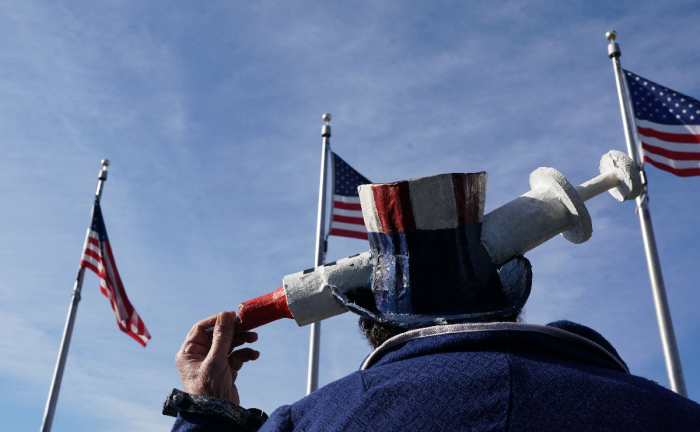62% of white Evangelicals have had at least 1 dose of COVID-19 vaccine: poll

A new survey reveals that while a supermajority of white Evangelical Protestants have had at least one dose of the COVID-19 vaccine, the group has the lowest vaccination rate among all demographic subgroups questioned.
Pew Research Center released the results of a survey examining Americans’ attitudes about the coronavirus pandemic on Wednesday. The survey, based on responses from 10,237 U.S. adults collected between Jan. 24–30, asked participants to share their views about how public health and elected officials responded to the pandemic, vaccine mandates, their comfort with participating in day-to-day activities, and their vaccination status.
Respondents consisted of members of Pew’s American Trends Panel, “an online national survey that is recruited through national, random sampling of residential addresses.”
Overall, 73% of respondents reported that they were fully vaccinated, while an additional 5% said they had received at least one dose of a coronavirus vaccine and needed to receive one more. Twenty percent of those surveyed had not gotten the shot.
Among the fully vaccinated, 66% claimed to have received a booster shot. The fully vaccinated and boosted population accounts for 48% of those surveyed.
Broken down by religious affiliation, vaccination rates were highest among Catholics, with 85% reporting that they had taken at least one dose of the coronavirus vaccine. The religiously unaffiliated had a vaccination rate of 80%, followed by white non-Evangelical Protestants (77%) and white Evangelical Protestants (62%).
The survey did not include non-white Evangelicals or minority non-Evangelical Protestants.
White Evangelical Protestants had the lowest vaccination rate of all demographic subgroups surveyed, although the uninsured (63%), Republicans and those who lean Republican (64%), as well as those living in rural areas (68%), had similar vaccination rates. The results of the Pew survey mirror those of previous polls, including an NBC News poll taken last summer, finding that 59% of white Evangelicals had taken at least one dose of the vaccine. The NBC poll also did not include data on non-white Evangelicals.
Earlier polls yielded conflicting results as to which demographic groups were most and least likely to get the shots. A poll conducted in March 2021 by Pew found that among all faith groups, white Evangelicals were the least likely to say they planned on taking the vaccine.
The alleged vaccine hesitancy among Evangelicals prompted the sketch comedy series “Saturday Night Live” to lambaste the group as “one of the biggest obstacles to herd immunity.” However, a report published in May 2021 found that secular Americans expressed more hesitancy about taking the vaccine than Evangelicals.
Data from the Centers for Disease Control and Prevention showed as of Thursday afternoon that nearly two years into the pandemic and more than a year after the first coronavirus vaccines became available, more than 213 million Americans are fully vaccinated, accounting for 64.2% of the total U.S. population. More than three-quarters of the population (75.7%) has received at least one dose of the vaccine. Less than half of the population aged 12 or older (42.5%) has received a booster shot.
Over the past two years, more than 900,000 Americans have died from coronavirus, according to the CDC. As of Thursday afternoon, Worldometer has measured the global death toll from the coronavirus pandemic at nearly 6 million.
With the second anniversary of the coronavirus outbreak and the subsequent imposition of lockdowns, mask mandates and vaccine mandates approaching, the Pew survey asked respondents how they felt about public health officials and elected officials’ responses to the pandemic. Since March 2020, the share of Americans who thought the “hospitals and medical centers” in their area did a “good/excellent job” responding to the coronavirus outbreak dropped from 88% to 81%.
In that same time period, the percentage of Americans who rated the response of public health officials as “excellent/good” decreased from 79% to 50%. The share of respondents who classified the response of their local elected officials to the pandemic as “excellent/good” dropped from 69% to 50%, while the positive reception rate toward state elected officials’ response to the pandemic decreased from 70% to 46%.
When he took office in March 2021, 54% of Americans thought President Joe Biden was doing an “excellent/good” job responding to the pandemic. Now, just 40% of Americans say the same.
Since the pandemic broke out in March 2020, Americans have grown increasingly comfortable participating in everyday activities. The share of Americans comfortable visiting with a close friend or family member in their home increased from 62% then to 85% now. Comfort with going to the grocery store rose from 57% to 84%.
The percentage of Americans who feel comfortable going to a hair salon or barbershop rose from 53% to 73%. Similar jumps occurred in respondents’ self-reported comfort in eating out in a restaurant (22% to 70%), attending an indoor concert or sporting event (23% to 19%) and attending a crowded party (9% to 34%).
When asked about vaccine mandates, air travel, attending sporting events or concerts and attending public colleges and universities in person were the only activities where a majority expressed support for requiring those seeking to participate to provide proof of vaccination.
Support for vaccine mandates for those activities stood at 58%, 53% and 52%, respectively. By contrast, majorities of Americans opposed vaccine mandates for eating inside restaurants (53%) and shopping at stores (59%).
Ryan Foley is a reporter for The Christian Post. He can be reached at: ryan.foley@christianpost.com





























